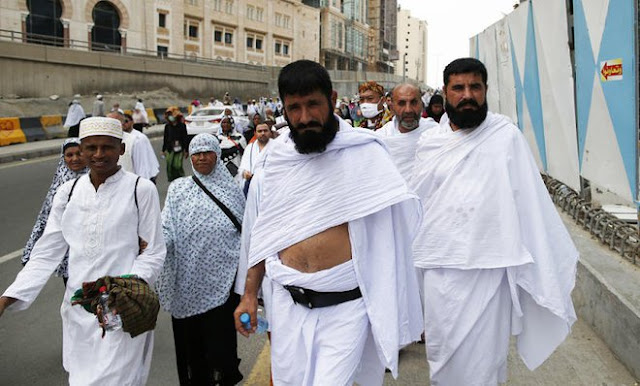RIYADH: Domestic pilgrims from some parts of the Kingdom will leave for Makkah on Thursday.
The Ministry of Health has advised them to take care of personal hygiene and ensure that they have all the needed vaccinations and carry medicines with them, in case of need.
More than 300,000 Saudis are expected to join the foreign pilgrims this year.
According to the General Directorate of Passports, until Tuesday, 1,310,408 pilgrims had entered the Kingdom.
The directorate said 1,233,029 pilgrims arrived by air, 64,656 over land, and 12,723 by sea.
This year, Saudi pilgrims were able to obtain permits to perform the Haj through online applications; payments were made according to the package chosen by the pilgrims.
The directorate had warned people not to attempt to do the pilgrimage without a permit given by the authorities.
Most of the pilgrims from distant places such as Dammam and Riyadh chose to leave for the pilgrimage on Thursday so that they can join Friday prayers.
Seventy-seven Haj operators from 200 companies work to serve pilgrims.
Tthe Haj and Umrah Ministry earlier advised people to deal only with registered companies.
Offers for Haj came out in three packages ranging from SR3,000 to SR11,980; SR5,892 to SR11,890; SR3,000 to SR5,250 and the most economical fare (“moyassur“) SR3,000.
Mohammed Saraff, a pilgrim from Riyadh, said he paid SR9,250, which includes full board and lodging in Makkah, Mina and internal transport between the Haj ritual sites.
“I only have to pay for the sacrificial lamb and the bus transport to and from Makkah,” he said.
A pilgrim from the Eastern Province said he will be starting the pilgrimage on Thursday, since it is a long journey from Dammam, while another from Jeddah said that he will start his pilgrimage on Saturday.
The “meeqat” points include Dhul Hulayfah, 9 km from Madinah; Juhfah, 190 km to the northwest of Makkah; Qarn Al-Manazil, 90 km to the east of Makkah; Dhat Irq, 85 km northeast of Makkah; Yalamlam, 50 km southeast of Makkah and Taif.
The famous Ayesha Mosque near Makkah is also considered as “meeqat” point that helps pilgrims perform Umrah again once they complete the obligatory pilgrimage.
Dr. Nazreen Sherbini, specialist in infectious diseases and influenza, said that in addition to vaccination against meningitis, it is advisable to take a flu shot before the pilgrims depart for Makkah.
“Pilgrims should wear a protective mask that covers the nose and their mouth in crowded places, and follow the basic health etiquette while sneezing or coughing,” Sherbini said, warning that they should keep away from people who have incessant coughing, sneezing and a body temperature of more than 38 degrees Celsius, and runny nose.
Sherbini said that all pilgrims should have taken the vaccination in time as advised by the doctors.
The flu vaccine helps prevent all types of flu, she said, adding that pilgrims do not require antibiotics for seasonal flu.
She said more liquids help the patients recover soon, except for those who suffer from renal, respiratory and cardiac diseases.
The Ministry of Health has advised them to take care of personal hygiene and ensure that they have all the needed vaccinations and carry medicines with them, in case of need.
More than 300,000 Saudis are expected to join the foreign pilgrims this year.
According to the General Directorate of Passports, until Tuesday, 1,310,408 pilgrims had entered the Kingdom.
The directorate said 1,233,029 pilgrims arrived by air, 64,656 over land, and 12,723 by sea.
This year, Saudi pilgrims were able to obtain permits to perform the Haj through online applications; payments were made according to the package chosen by the pilgrims.
The directorate had warned people not to attempt to do the pilgrimage without a permit given by the authorities.
Most of the pilgrims from distant places such as Dammam and Riyadh chose to leave for the pilgrimage on Thursday so that they can join Friday prayers.
Seventy-seven Haj operators from 200 companies work to serve pilgrims.
Tthe Haj and Umrah Ministry earlier advised people to deal only with registered companies.
Offers for Haj came out in three packages ranging from SR3,000 to SR11,980; SR5,892 to SR11,890; SR3,000 to SR5,250 and the most economical fare (“moyassur“) SR3,000.
arabnews.com
“I only have to pay for the sacrificial lamb and the bus transport to and from Makkah,” he said.
A pilgrim from the Eastern Province said he will be starting the pilgrimage on Thursday, since it is a long journey from Dammam, while another from Jeddah said that he will start his pilgrimage on Saturday.
The “meeqat” points include Dhul Hulayfah, 9 km from Madinah; Juhfah, 190 km to the northwest of Makkah; Qarn Al-Manazil, 90 km to the east of Makkah; Dhat Irq, 85 km northeast of Makkah; Yalamlam, 50 km southeast of Makkah and Taif.
The famous Ayesha Mosque near Makkah is also considered as “meeqat” point that helps pilgrims perform Umrah again once they complete the obligatory pilgrimage.
Dr. Nazreen Sherbini, specialist in infectious diseases and influenza, said that in addition to vaccination against meningitis, it is advisable to take a flu shot before the pilgrims depart for Makkah.
“Pilgrims should wear a protective mask that covers the nose and their mouth in crowded places, and follow the basic health etiquette while sneezing or coughing,” Sherbini said, warning that they should keep away from people who have incessant coughing, sneezing and a body temperature of more than 38 degrees Celsius, and runny nose.
Sherbini said that all pilgrims should have taken the vaccination in time as advised by the doctors.
The flu vaccine helps prevent all types of flu, she said, adding that pilgrims do not require antibiotics for seasonal flu.
She said more liquids help the patients recover soon, except for those who suffer from renal, respiratory and cardiac diseases.
Source: arabnews.com


No comments:
Post a Comment